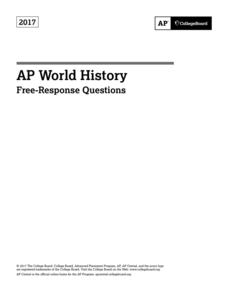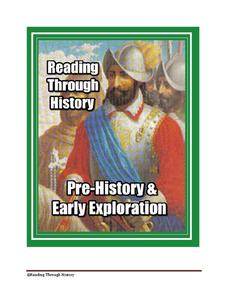College Board
2018 AP® United States History Free-Response Questions
Learners explore the the Age of Imperialism using primary sources and an authentic College Board documents-based question. Other prompts explore the economic changes brought about by the American Civil War, technology, mercantilism, and...
College Board
2017 AP® United States History Free-Response Questions
Were unfair taxes really the cause of the American Revolution? Learners explore the complicated historiography behind the revolutionary period using authentic College Board prompts. The free-response questions from the exam feature...
National Constitution Center
AP English Language—Precision of Language
Say what you mean and mean what you say. The Precision of Language addresses the importance of words, especially when they concern a person's rights. Scholars take a look at many different examples and complete questions analyzing the...
Benjamin Franklin Tercentenary
The Autobiography of Benjamin Franklin
Need a model for character education? Benjamin Franklin presents himself as in a constant state of striving to become the man he hoped to be, making his autobiography is far more accessible to learners than those of people who consider...
Benjamin Franklin Tercentenary
What Ben Read
Just what did Ben Franklin read? By juxtaposing Ben Franklin’s reading material as a young man with an analysis of his developed ideas, learners gain the opportunity to see how the influences of his youthful reading played out. Roman,...
Benjamin Franklin Tercentenary
Reading the Work of B. Franklin, Printer
Placing Ben Franklin’s ideas about a free press next to those embodied in the First Amendment sheds light on both. Learners interpret and compare two primary sources and then examine them in the light of a contemporary survey about...
New York State Education Department
US History and Government Examination: August 2015
Are your learners feeling a bit jittery about an upcoming American history standardized test? Take a look at a state standardized test to give them additional practice and ease their nerves. Extra practice includes a scaffolded...
Independence Hall Association
American History: From Pre-Columbian to the New Millennium
Need an online resource to supplement the paper textbook in your classroom? An all-encompassing website covers historical events throughout the last half of the second millenium, leading right up to the third. From the pre-Columbian...
Reading Through History
Tulsa Race Riots
How did the 1921 riots in Tulsa start? Pupils read information about the riots that occurred in Tulsa. Following the reading, they answer multiple-choice questions and guided reading questions to help them along the way.
Reading Through History
Anti-Federalist Paper No. 47
The path to a more perfect union was rockier than most history books would lead you to believe. Young historians read “Antifederalist No. 47,” written by James Madison (under the pen name “Centinel”), which sharply criticizes the...
Reading Through History
The Proclamation of 1763
The French and Indian War concluded with an important proclamation—that is, The Proclamation of 1763. Scholars read about the policies in the document and how the different sides of the French and Indian War reacted. Following, they...
Reading Through History
The Leadership of George Washington
Why did Americans choose George Washington as their first president? After reading the resource, pupils discover why citizens trusted him to lead the country. They learn about his time as a military leader, as well as his actions after...
Reading Through History
The Battle of Yorktown
The Battle of Yorktown was an important battle of the American Revolutionary War for all sides. Learners read everything from the point of view of the British, the Americans, and finally, the French. After reading, they answer...
Reading Through History
The Cold War: The Space Race
What do the Cold War and the Space Race have in common? Learners search for that answer and many more, helping them to build their knowledge of historical global politics and tensions between nations. Following the reading, they answer...
Reading Through History
The Federalist Papers: Federalist Paper No. 10
James Madison, under the pen name “Publius,” justifies the need for an American Republic in Federalist Paper 10, which is perhaps one of the most influential contributions to the Federalist Papers. Readers examine his perspective with...
Reading Through History
Early History and Exploration Unit
We all know about Christopher Columbus, but who else explored the Americas, and specifically, the future United States of America? Learners find out these answers and more in a resource that includes four different reading sections,...
Reading Through History
Patriots and Loyalists
Patriots versus Loyalists, a huge divide during the Revolutionary War in what would become the United States of America. An informative resource includes both direct instruction about the two groups and a quiz pupils take after reading...
Judicial Learning Center
Do You Know Your Bill of Rights?
The Bill of Rights is much more than an important piece of paper! The rights cover everything from freedom of speech to the right to remain silent if arrested. Scholars find out their own rights by answering the questions in the form of...
Judicial Learning Center
Article III WebQuest
Why is Article III of the constitution so significant? Pupils discover the importance of Article III and how it relates to past as well as current events by completing Internet research using a provided handout. They learn everything...
Orlando Shakes
The Best of Enemies
History comes to life with the play The Best of Enemie. Scholars learn literary elements as well explore racial issues in American history. The play is based on a true story and addresses the universal truth that people are capable of...
Ford's Theatre
Socratic Seminar/Group Discussion: The Crisis of the Civil War
High schoolers work in four different groups to examine the many factors that led to the American Civil War. They research an assigned topic, prepare questions, and finally engage in a class discussion using the Socratic Seminar method.
Ford's Theatre
A Comparison of Lincoln’s Inaugural Addresses
Speech, speech! Analyzing speeches is no easy task. High schoolers learn the important process of annotation as they work together to analyze Lincoln's inaugural address. Then groups of four work to annotate a second speech at a more...
The Alamo
The Alamo Then and Now
The Alamo is one of the most famous buildings from the Texas Revolution. But what does it look like today, and how has it changed? Pupils find out more using different interactive modes, including a split-screen and side-by-side version.
PBS
Analyzing McCulloch v. Maryland
What happened in the Supreme Court case of McCulloch v. Maryland? The resource teaches the specifics of the case with a video and provided discussion questions covering issues such as precedent and the Supreme Court as an equal branch of...

























